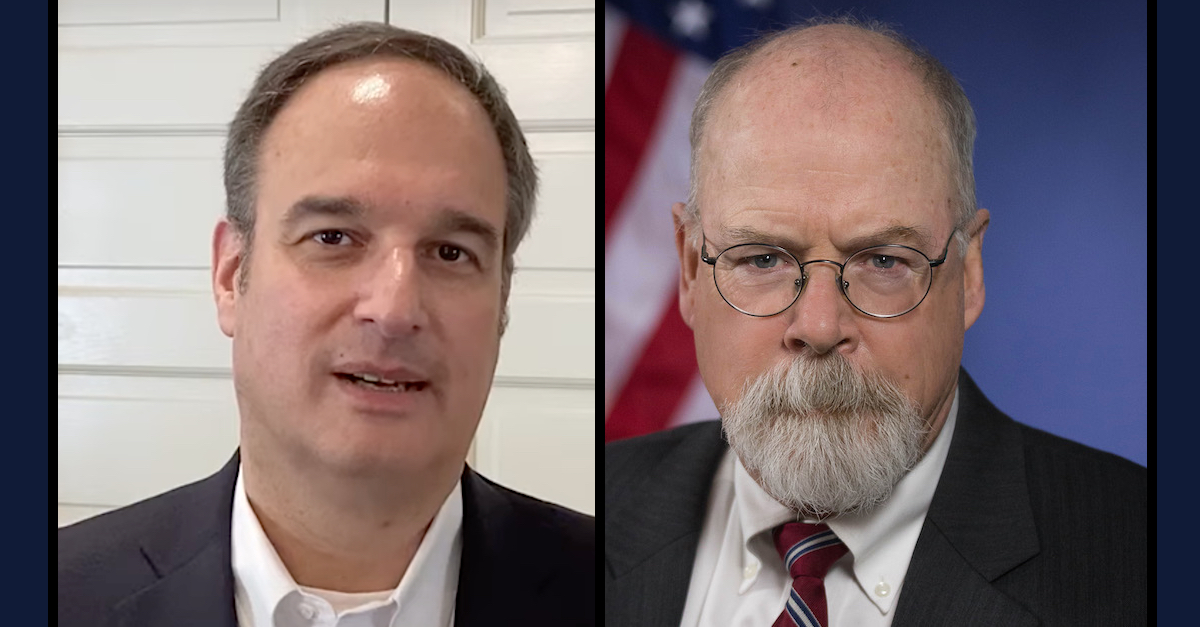
Michael Sussmann and John Durham.
Special Counsel John Durham’s legal team has refused to preemptively limit the questions posed to a former New York Times journalist who has been subpoenaed to testify for Michael Sussmann in an upcoming trial. That’s according to documents filed late this week by lawyers for the reporter.
A motion for a protective order filed by Eric Lichtblau, the former Times journalist and a two-time Pulitzer winner, seeks to block such questions from deviating beyond the core conversations between Lichtblau and Sussmann — conversations which led to a 2016 report about Donald Trump’s alleged links to Russia.
Sussmann is charged with making a false material statement to the FBI about internet data connected to Trump in the lead-up to the 2016 election. The alleged lie, according to Durham, is that Sussmann did not fully disclose that his efforts were connected to his association with — and work for — then-rival candidate Hillary Clinton when he provided the data to then-FBI counsel James A. Baker. Sussmann’s conversations with reporters about that data have also come into play in connection with the case.
Lichtblau’s filings identify him as “Reporter-1” in the Sussmann indictment and confirms that the New York Times was called “Newspaper-1.”
“According to the indictment, Mr. Lichtblau communicated with the defendant . . . in advance of Mr. Sussman’s September 19, 2016 meeting with FBI officials,” the motion indicates. “Statements that the defendant allegedly made at that meeting [with the FBI] form the basis for the charge in this case.”
Eric Lichtblau. (Image via YouTube screengrab.)
Lichtblau was behind an Oct. 31, 2016 Times report entitled “Investigating Donald Trump, F.B.I. Sees No Clear Link to Russia.” An affidavit filed this week reveals that Sussmann “was a confidential source” for that report, but it says Sussmann has since waived his request of confidentiality from Lichtblau.
Sussmann subpoenaed Lichtblau to testify on his behalf in an upcoming trial, and Lichtblau was further drawn into the matter, according to the motion:
Mr. Sussmann has waived confidentiality with respect to his communications with Mr. Lichtblau, and last month he served a trial subpoena on Mr. Lichtblau. Through counsel, Mr. Lichtblau promptly raised his concerns about protecting other, privileged and sill-confidential news sources and unpublished newsgathering information. Counsel for Mr. Sussmann ultimately agreed to limit the scope of questioning at trial to the communications between Mr. Sussmann and Mr. Lichtblau — i.e., information subject to the waiver. Such communications conceivably may be relevant to what Mr. Sussmann knew on September 19, 2016 and therefore whether he knowingly made a materially false statement to the FBI.
But Durham, however, “has refused to similarly limit the scope of questioning,” the document alleges:
Following a period of consideration, the prosecution on May 2, 2022 stated that it could not provide “any assurance” that cross-examination of Mr. Lichtblau would be confined to his communications with Mr. Sussmann. To the contrary, counsel for the government stated that certain of Mr. Lichtblau’s email communications with third parties during the course of his news reporting were within the prosecution’s possession, and that the prosecution might examine Mr. Lichtblau about aspects of his reporting separate and apart from his communications with the defendant. During discussions, the Special Counsel acknowledged the Department of Justice’s new policy restricting the use of compulsory process to obtain information from reporters, but indicated a view that any reporters privilege was “pierced” by a trial subpoena.
According to the motion, Lichtblau is comfortable testifying given the waiver offered by Sussmann. But the document says Litchtblau was not pleased about the Special Counsel’s “intention to pursue questioning that may seek or lead to the identification of other confidential news sources . . . or encompass newsgathering communications other than those with the defendant.” Therefore, Lichtblau asked U.S. District Judge Christopher R. Cooper to preemptively limit questioning about collateral matters.
Lichtblau’s attorneys cited Rule 17 of the Federal Rules of Criminal Procedure, the privileges afforded to reporters under the First Amendment and under the common law, and the Federal Rules of Evidence — specifically the rules involving hearsay and relevancy — in support of the argument.
“[T]estimony about reporting done by Mr. Lichtblau apart from his communications with Mr. Sussmann — i.e., involving other communications with other sources and potential sources — would be entirely laking in probative value,” the motion argues. “Because reporters like Mr. Lichtblau were seeking to verify the data, any testimony would necessarily delve into the accuracy of data, a subject this Court has sharply limited.”
Lichtblau then pointed to a recent case where the same district court — and the same judge, Judge Cooper — limited a subpoena which sought communications with FOX News that were “less relevant” to a previous case.
“Narrowing the scope of questioning to which Mr. Lichtblau can be subjected at the upcoming trial in this matter is likewise the best course of action here, and for precisely the same reasons the Court articulated” in that previous matter, the motion goes on to argue. “Mr. Lichtblau’s testimony about any subject other than his interactions with Mr. Sussmann can be of no conceivable relevance to this case, and allowing either party to question Mr. Lichtblau about such other, irrelevant topics clearly invites ‘an unwelcome chilling effect on First Amendment activity’ and ‘creates obvious First Amendment problems.'”
Judge Cooper, a Barack Obama appointee, ordered Durham’s team to respond to the motion on or before May 17.
Read the motion, the affidavits, the exhibits, and the proposed protective order below:
[photo of Sussmann via YouTube screengrab; photo of Durham via U.S. Department of Justice portrait]